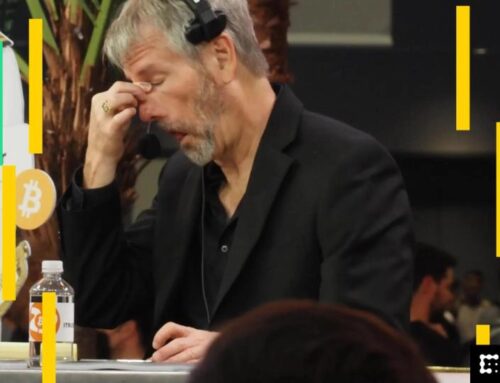How a local program aims to grow Southern Arizona students into environmental leaders
April 24, 2025
When the Youth for Blue Skies program began, Mia Nicole Leon knew her hometown of Nogales struggled with its air quality, but she didn’t yet know the complicated ways that bigger forces impacted the air.
After several months as an intern with the environmental education program run by local nonprofit Ironwood Tree Experience, Leon sees the bigger picture — and has a plan for what she’d like to change, like trucking and factories impacting her community.
“I thought Tucson would have been worse in air quality than Nogales, which turns out Nogales is worse,” said Leon. “Learning is just an interesting experience.”
Leon is one of a group of students from schools across Pima County who get a stipend to go hiking, camping and attend local community events, all with the goal of learning about air quality in their communities and how to improve it in the future.
The program is supported by the Pima County Department of Environmental Quality, which administers the funding from the decades-long Clean Air Program, aimed at reducing air pollution and car emissions. County staff members also teach lessons on air quality during the program.
In a time of uncertainty caused in part by the Trump administration’s efforts to minimize federal funding for nonprofits that deal directly with climate change and environmental preservation, it shows the way that local investment can create space for learning and programming.
“When so much feels up in the air and out of control, there is a sense of returning to what is in front of us: our local community and the people that support us,” said Deborah Oslik, associate director at Ironwood Tree Experience. “We are providing space for people to have authentic connections with this place and one another without their phones between them.”
Natalie Shepp, climate and community engagement manager at the Pima County Department of Environmental Quality, has helped to steward the program.
“We need to be educating young people about the importance of environmental protection and protecting our air quality so that they can respect the environment, protect it, and potentially get involved in a career path themselves,” she said.
Both Oslik and Shepp remember a key experience in their adolescence where they connected with the natural world, and how it helped drive them to continue to engage with it as adults.
For Oslik, her experience at Jewish community retreats that took place in Chesapeake Bay and the forest near the Washington, D.C area offered “just free-roaming time for the kids to play in wild spaces. That felt really special.”
Shepp’s experience in an environmental student club in high school ignited her interest in the natural world, which deepened when she moved to Tucson to study the environment. Her ongoing love for the mountains, which she uses as a visual barometer to judge the air quality in Tucson on a given day, helps deepen that.
Now in its fourth year, the Youth for Blue Skies program continues to instill that connection to the natural world —and a desire to protect it — in students who participate, say both Oslik and Shepp.
“We hope that kids will feel more connected to their community and have a stronger sense of place where they live: Tucson, the Sonoran desert and the borderlands, and be more confident to speak to being a resident of this place,” said Oslik. “It’s really hard to fight for something that you don’t yourself have an important relationship to.”
Students will share their final presentations at the Collaborative Research in Action Symposium May 3.
Here is what some of the young people in the program have to say about how they think about the climate in their community, and what they want to see moving ahead:
These interviews have been edited for length and clarity

Mia Nicole Leon, 17, Nogales High School
What is something you learned that has stuck in your mind or surprised you?
I thought Tucson would have been worse in air quality than Nogales, which turns out Nogales is worse. We’re a small town but we share the border, and there are so many activists in Tucson trying to help Tucson. The air is not very taken care of in Nogales.
What change would you like to see in the world, and what role would you like to play in it?
Better air quality in smaller towns, and more education towards water quality and how much we use of it. I’d like to be able to conserve it more. A lot of the water that we use is also connected to our air quality.
What is one thing you love about the community or natural environment you live in?
Nogales is a beautiful place, when you see it from a different perspective. But living in it, it’s not always the best. [During this internship], I loved the experience when we went hiking and walking in Sweetwater Wetlands.

Sarah Loomis, 17, Tucson High Magnet School
What is something you learned that has stuck in your mind or surprised you about what you’ve learned?
In Arizona, the amount of gallons that comes to us per month is [more than] millions of gallons of water. That shocked me because I feel like I don’t use that much water, but as I kind of go out in my day to day life and think of the water bottles that I use, the water that I drink, I shower with, wash dishes with it basically just made me feel more like conservative of my water use.
What change would you like to see in the world, and what role would you like to play in it?
I believe that everybody has a part in changing the world. It can take just one person to make an impact, but once you have some people who are as interested in changing the world as you are, that can play a really big part. I would like to see heat levels go down, and I would like to see more communities that recycle dirty water or do rainwater conservation.
The earth that we live in not only tells our past and our present, but eventually, with us being the younger generation, we will become the future as well.
What do you love about the community or natural environment you live in?
I love all the trees and the native plants. I think that the flowers are gorgeous here when they do pop up, like the little flowers on the cactuses. It’s so cool how cactuses grow and just the places that we do see are so green.

Ana Paula Ramirez Lopez, 16, Nogales High School
What is something you learned that has stuck in your mind or surprised you?
One day we had a presentation where they were presenting about how they see the different air pollution varied in different schools.The results showed that there was more air pollution in schools with lower incomes. I think about that a lot.
What change would you like to see in the world, and what role would you like to play in it?
I want to focus on trash collection in the oceans. I follow a lot of Instagram accounts that you see put nets in rivers to stop the trash flow into the oceans, and then they collect it after three days, and they do these montages, and it’s a crazy amount of trash. I’d love to help with that.
What is one thing you love about the community or natural environment you live in?
I love how the saguaros look. I love how each individual one is a home for different animals. It’s food for us, it’s food for them. How can one little plant do so many things for so many different people?

Santiago Watson, 16, University High School
What is something you learned that has stuck in your mind or surprised you?
The Central Arizona Project, that one’s also always super crazy to me. I didn’t know about it until this internship. [The Central Arizona Project is a canal that supplies Colorado River water to the most populated regions in Arizona.]
What change would you like to see in the world, and what role would you like to play in it?
The more education we can have about all these things that play a huge factor in our lives: to see if we can save water or help preserve habitats or just play our part and not making the world worse.
What is one thing you love about the community or natural environment you live in?
Tucson’s awesome. There’s so many friendly people, there’s such a diverse group of people, too. You can learn so much about food, culture, nature. It’s fascinating.

Janeen Pacheco, 18, Cienega High School
What is something you learned that has stuck in your mind or surprised you?
A lot of this group has really made me understand that air quality isn’t just from factories, it comes from agriculture and water and plastic production. I have noticed how much of an impact it has on some communities especially in southern Tucson, and how little they have a voice about it.
What change would you like to see in the world, and what role would you like to play in it?
I really like community impact, since I’m a person of color. I find that my voice is really important, especially since my family comes from an Indigenous agricultural background. so I kind of just want toraise awareness of air quality and environmental issues within that field.
What is one thing you love about the community or natural environment you live in?
I definitely really like how Tucson’s very diverse. A lot of cultures blend together. I like how there’s a lot of community festivals and events to make the environment cleaner. I really enjoy when we pull invasive species out of rivers. People who lived in Marana all came together to pull buffelgrass and that was really fun.

Cooper Kalil, 16, The Gregory School
What is something you learned that has stuck in your mind or surprised you?
I realize there’s a lot more to do with air quality than just carbon dioxide. There’s all sorts of stuff being put into the air that we don’t want in the air, so I have a better idea of what specifically is going on in our air. Philosophically, meeting people who are still fighting for the environment is really helpful.
What change would you like to see in the world, and what role would you like to play in it?

What is one thing you love about the community or natural environment you live in?
I think it’s really incredible that life has flourished out in a desert. Getting water here is pretty incredible.
Enedina Valdez, 16, Tucson Magnet High School
What is something you learned that has stuck in your mind or surprised you?
When you’re trying to break something down into smaller topics for a presentation it’s called “mindmapping.” For example, social justice when it involves air quality. We’ll ask: what does this remind me of? How does that relate to what I’m trying to understand?
What change would you like to see in the world, and what role would you like to play in it?
I definitely want to see better air quality for ecosystems and animals and plants. And in the future, I do want to try to help. I want to become a botanist. I’m hoping to work with plants and research their effect on the environment and their relation to animals and air quality, and that is how I plan to help in the future when it comes to environmental justice.
What is one thing you love about the community or natural environment you live in?
I love that in the community we have ITE [Ironwood Tree Experience]. It kind of feels like everyone’s friends and there’s no infighting. It’s really nice to just be able to come here and share your ideas with people who are very like minded. I love this organization.
Search
RECENT PRESS RELEASES
Related Post




